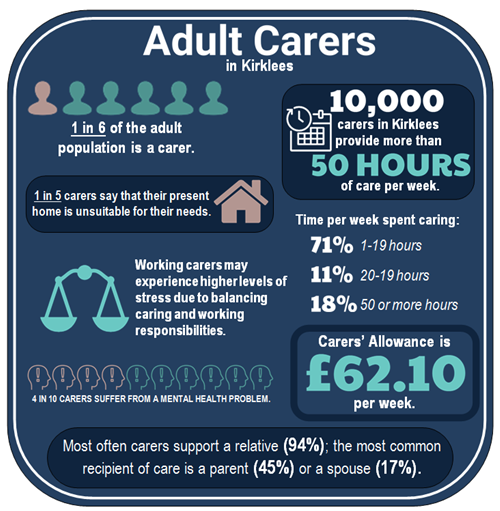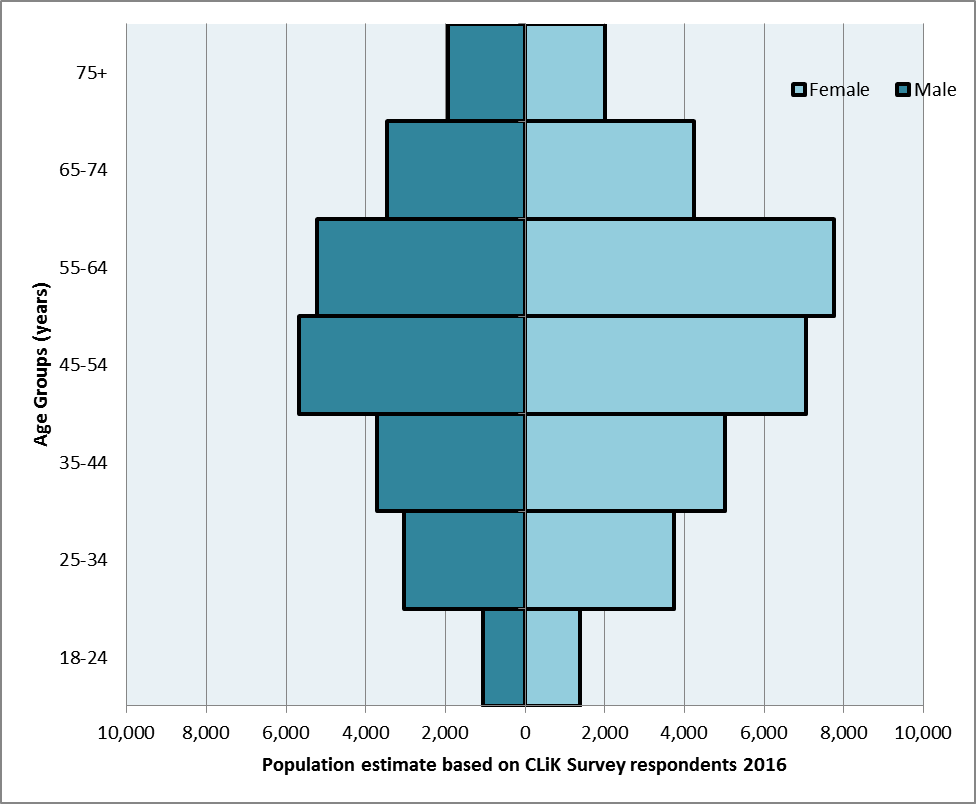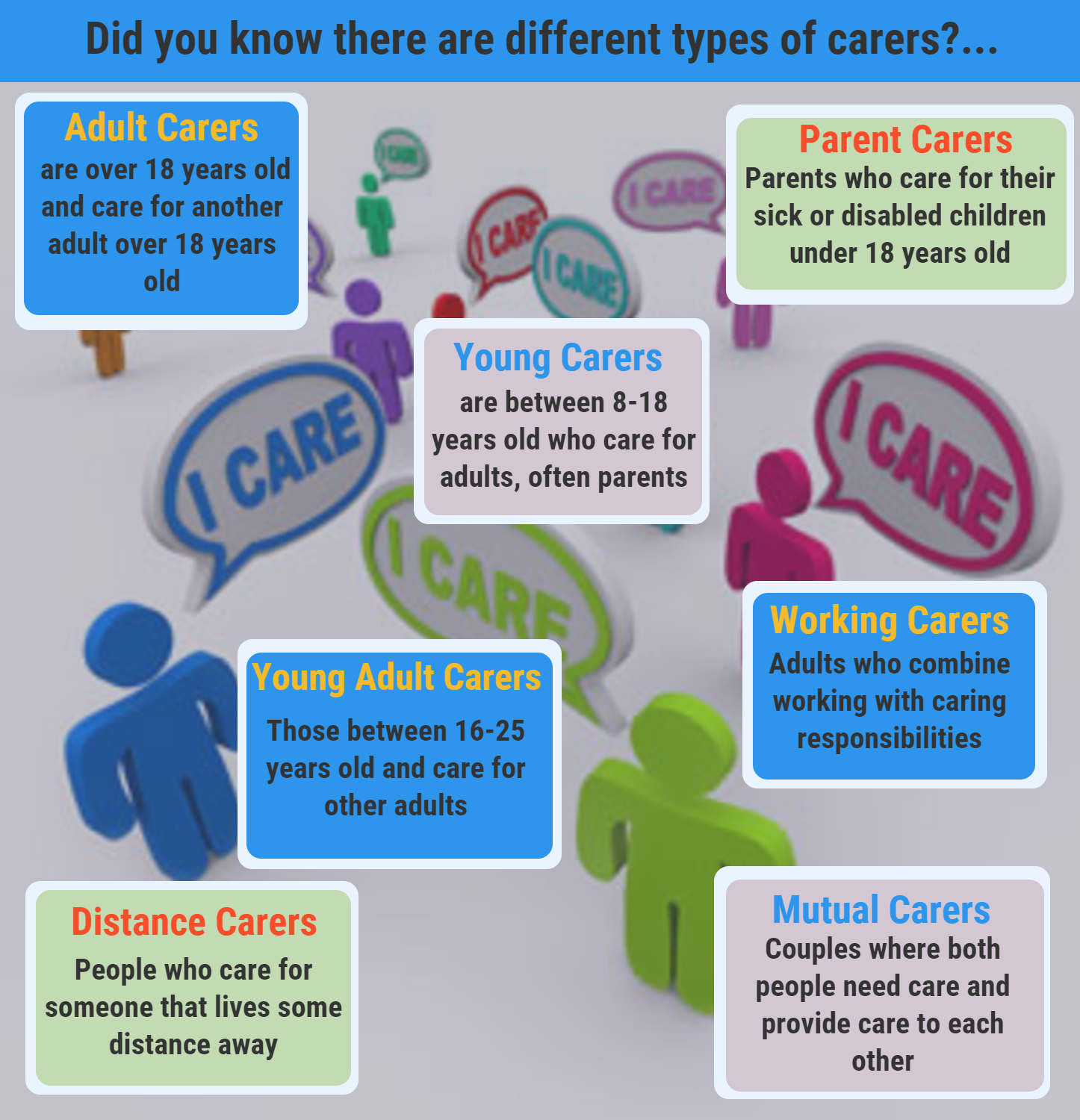
 Adult carers
Adult carers
Headlines

Why is this issue important?
Carers’ ability to provide care directly affects the amount of health and care support the state needs to provide to people with disabilities. Health and care services rely on carers to provide the lion’s share of support. However, carers are often unable to manage their own health and relationships due to their caring role. Without support carers can be pushed to breaking point and feel forced to give up work, give up their social life and activities, and sometimes go into hospital themselves. This need not be the case.
As the number of people who require health and care support increases, so the number of carers increases. And as health and care support moves from away from secondary care and towards more primary and community care the burden on those carers increases and the social care and health economy creates an even greater reliance on carers. Providing this support affects carers’ own health and quality of life and unless they are supported to live healthily carers are less able to support people with disabilities and more likely to need health and care support themselves in the future. Many carers don’t think of themselves as carers and don’t look for support until they find themselves in crisis.
Carers needs span both health and social care. Often carers don’t differentiate between types of support and having different health and social care pathways can increase confusion, anxiety and stress for carers. Health and social care commissioners and providers are collaborating more closely to make organisational boundaries less obvious to carers with a view to help carers simply get the help they need when they need it.
Around 56,000 people aged 18 and over in Kirklees are carers, which is 1 in 6 (17%) adults. Due to advances in healthcare and more support being provided outside of hospitals, Carers UK estimate the number of carers will increase by 40% over the next 20 years (2). This will mean Kirklees will have almost 80,000 adult carers by 2037.
Seven in 10 (71%) carers provide between one and 19 hours of care per week, one in nine (11%) provide between 20 and 49 hours per week and one in six (18%) provide 50 hours or more (1).
What significant factors are affecting this issue?
There are many common factors affecting all carers and as well as this different carers in different situations have widely difference experiences of caring, resulting in widely different needs. Both locally and nationally, carers experience disadvantage and lack of equality.
- Carers providing high levels of care are twice as likely to suffer from ill health as non-carers (3).
- There are 10,000 carers in Kirklees who provide more than 50 hours of care each week (1), of these many care around the clock, for example those who care for someone with dementia are often 24/7 carers. More than 70 per cent of those caring round the clock have suffered mental ill health at some time (4).
- Four in 10 (40%) of people who spend 50 hours or more per week caring for somebody reported suffering from a mental health condition in the past 12 months compared to three in ten (28%) of non-carers.
- Three in 10 (29%) carers said they experience sleep problems all or most of the time compared to two in 10 (22%) of those without caring responsibilities.
- Carers of people with mental health problems may provide periods of intensive emotional support on a more irregular basis and they, along with Carers of people with substance misuse problems, can be affected by shame and social stigma.
- Carers of sons and daughters with learning disability or complex physical disability are more likely to be lifelong carers with long-term negative impacts on their employment opportunities, affecting their financial stability (1). One in four (26%) of those caring for a child said that, in the past few weeks, they had worried about money all or most of the time, compared to one in five (21%) of those without caring responsibilities.
- Working carers may experience higher levels of stress as they try to balance caring and working responsibilities.
- Carers of people with physical disabilities or older people are at a higher risk of experiencing injury or pain due to moving and handling.
- 7% of carers felt isolated most of the time. This is similar to non-carers (1)
- One in five (21%) of those who spend 50 or more hours caring for somebody said that their home is not suitable for their needs, compared to one in 10 (10%) of those with no caring responsibilities. (1).
- Around twice as many (20% v 11%) carers than non-carers stated that their home is not suitable because of their physical or mental health conditions or illnesses, and almost twice as many (23% v 13%) carers as non-carers stated their home is unsuitable due to their mobility needs (1).
- Carer’s Allowance can only be claimed by those providing 35 hours or more care per week, who are not in education for more than 21 hours per week, and who have a very low income. Therefore it is usually claimed by carers unable to work due to their caring responsibilities. At £62.10 per week the Carer’s Allowance is considered low by Carers UK as it is £11 per week less than Job Seekers Allowance. 8,290 carers in Kirklees are entitled to claim it (5), however, 3 in 10, do not claim. (6) Since 2012 the number of people entitled to claim has increased by 16.8% showing that the numbers of carers is increasing. Over this time, the percentage of these who do not claim Carers Allowance has decreased from 35.5% in 2012 to 29.6% in 2016 showing that carers are more aware of their entitlements.
Which groups are most affected by this issue?
A carer of any age provides unpaid support to family or friends. This could be caring for a relative, partner or friend who is ill, frail, disabled, or has mental health or substance misuse problems.

1 in 6 people in Kirklees are Carers showing that being a carer is normal and carers can be anyone. Carers span all ages, gender, geographic localities, ethnicities, and social and economic groups, although carers are more likely to be female and the peak age for caring is 45 to 64. 21% of carers are aged over 65, and caring can significantly impact the health of this cohort. Most often, carers support another relative (94%), and the most common recipient of care is a parent (45%) or a spouse (21%) (1).

Where is this causing greatest concern?
Adult Carers are spread throughout all Kirklees localities and reflect the ethnic diversity of Kirklees. In 2016, the ward with the lowest proportion of adult carers was Kirkburton (one in 10) whereas the ward with the highest proportion of adult carers was Holme Valley South (one in four).
Views of local people
Locally, carers have said they need (7):
- Information to help them to navigate through health and social care services.
- Better information sharing between health and social care statutory organisations.
- Better recognition by GPs and GPs need to offer more information on services to support carers including non-NHS support.
- Staff involved in hospital discharge to consult carers more and make sure that carers know what is happening at discharge and are a central part of the discharge process.
- Communities and front line services to have a better knowledge of what being a carer is, how people can help, and to have less stigma attached to carers and people with disabilities.
- The time, hard work, and support carers provide to be recognised and valued.
- There to be help with coping with the stress and anxiety of being a carer.
- To be supported to get a break from and have a life outside their caring role.
Assets
Health assets are those things that enhance the ability of individuals, communities and populations to maintain and sustain health and well-being. These include things like skills, capacity, knowledge, networks and connections, the effectiveness of groups and organisations and local physical and economic resources. They also include services or interventions that are already being provided or beginning to emerge which contribute to improved health and wellbeing outcomes.
Assets are hugely important to how we feel about ourselves, the strength of our social and community connections and how these shape our health and wellbeing.
As part of our KJSA development we are piloting a range of methods to capture and understand the assets that are active in Kirklees. Please see the assets overview section for more information about our approach and if you are interested in place-based information about assets in Kirklees have a look at the assets section in each of our District Committee summaries (Batley and Spen, Dewsbury and Mirfield, Huddersfield and Kirklees Rural). Where possible and appropriate we will provide information about local assets supporting people across different stages of the life course.
In its report Valuing Carers 2015 Carers UK estimate that to replace the support provided by Kirklees carers would cost (8)
| a year | a week | a day | an hour | a minute | a second |
| £848m | £16¼m | £2.3m | £96,700 | £1,600 | £26.87 |
This works out to £15,100 per carer per year. Clearly there isn’t the money to replace this vital care and without it the health and social care economy would collapse. It’s unrealistic to think that all carers would suddenly stop providing care as that simply isn’t in the nature of carers, however, if only a small proportion were unable to continue the effect would be catastrophic.
Please see the KJSA Carers Assets document here for information on carers support services in Kirklees and useful websites
What could commissioners and service planners consider?
Commissioners, service planners and Councillors should consider local community assets such as those outlined above so that they can support and build on local strengths and also understand where there are gaps and unmet needs in particular places or amongst particular communities.
Commissioners and planners need to consider their role in helping carers identify themselves. Carers often do not recognise themselves as carers and so will not identify with Carers Support. Instead they are more likely to identify themselves as a husband, wife, daughter, son, etc. All services, not just Carers services, are able to support carers to think about and access lower-level support to help them to continue and get the most out of their caring role. Identifying carers early in their caring role can prevent greater health and wellbeing problems and avoid greater support needs in the future. Professionals working within health and social care have a crucial role in identifying carers and so these staff must be aware of carers, understand the impacts caring can have, and know where the carer can turn to get more information and help.
Commissioners and planners need to ensure their organisation and the organisations that they commission are signed up to the Kirklees Carers Charter and are actively engaging with it to improve the support they give to carers who use their services and carers who work for them. Please see here for more information about the Carers Charter and here for the Kirklees Carers Charter that was launched in 2016.
Professionals do not need detailed knowledge of carers issues but to simply understand what a carer is, the importance of reinforcing the message that the carer would benefit from speaking to someone about ways they can be helped, and where they can be signposted for support.
The kinds of lower-level support professionals can refer to includes information about issues affecting carers, peer support groups, and helping carers with emotional support and coping strategies.
As carers needs span both health and social care and often carers don’t differentiate between health and social care so health and social care commissioners and providers must collaborate to make organisational boundaries less obvious to carers and help carers simply get the help they need when they need it.
References
- Kirklees Council. Current Living in Kirklees Survey 2016. 2016.
- Carers Trust. Facts About Carers 2014. 2015. Available from: http://www.carersuk.org/for-professionals/policy/policy-library
- Department of Health. Our Health and Wellbeing Today. 2010.
- NHS England. Commitment to Carers – Improving carer health and wellbeing. 2016. Available from: https://www.england.nhs.uk/2016/05/commitment-to-carers/
- Department for Work and Pensions. Carer’s Allowance – All Entitled Cases Caseload (Thousands): Local Authority of Claimant by Region. 2012. Available from: http://83.244.183.180/100pc/ca_ent/ccla/ccgor/a_carate_r_ccla_c_ccgor_feb12.html
- Department for Work and Pensions. Carer’s Allowance – Cases in Payment Caseload (Thousands): Local Authority of Claimant by Region. 2012. Available from: http://83.244.183.180/100pc/ca/ccla/ccgor/a_carate_r_ccla_c_ccgor_feb12.html
- Kirklees Council. Kirklees Carers Strategy Update. 2015.
- Carers UK. Valuing Carers. 2015. Available from: http://www.carersuk.org/for-professionals/policy/policy-library/valuing-carers-2015
Date this section was last reviewed
23/01/17
